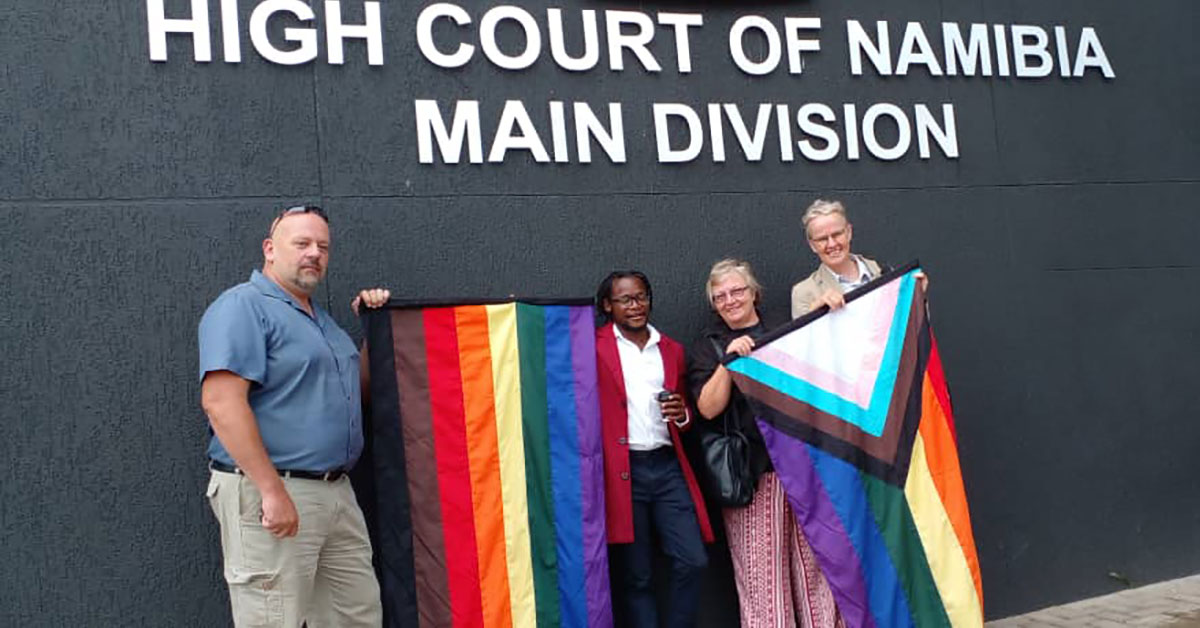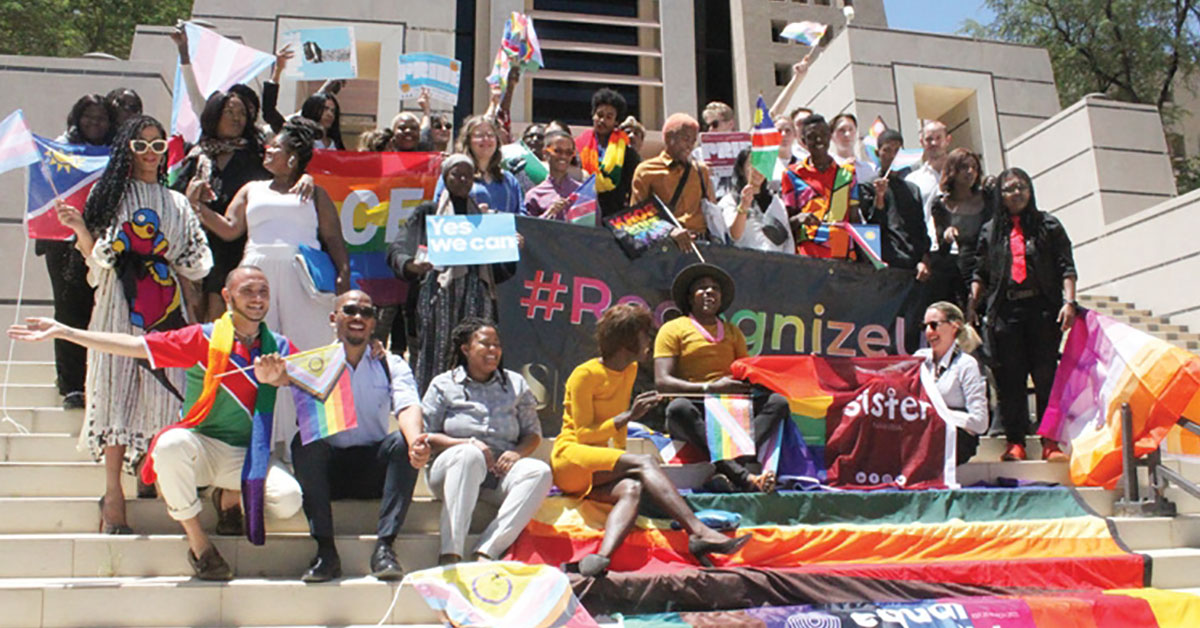Namibia | Same-sex couples find community in their legal challenge

Two couples – Johann Potgieter and Daniel Digashu, and Anita Seiler-Lilles and Anette Seiler – are challenging Namibia’s refusal to recognise their relationships (Photo: supplied)
Daniel Digashu, one-half of one of the two couples fighting for the right to be recognised by the Namibian state, writes about how they found community in their historic journey to the Supreme Court.
On 3 March 2023, the Supreme Court of Namibia heard an appeal of the two consolidated cases of same-sex couples Digashu and Seiler-Lilles.
Digashu, a South African citizen, and Seiler-Lilles a German citizen are married to Namibian citizens. In both cases, Digashu and Seiler-Lilles were denied immigration into Namibia based on same-sex union statuses that are “not recognised” in Namibia law.
In 2017, when the couples started the litigation journey, they they felt completely alone in the fight against injustice. The experience of applying to settle with their spouses in Namibia was gruelling, emotionally and financially taxing because of the constant delays, being moved from pillar to post and subsequent rejection.
The debacle impacted the couples’ overall mental health, finances and futures. From living relatively free lives in their respective spouses’ countries, to feeling completely lost, and like they do not belong in Namibia, it has put tremendous pressure and stress on their relationships.
Namibia is a place both couples decided to settle and live in, and they felt that they had that freedom of choice, at least. After realising they were not afforded that freedom of choice and their rights, they decided to take these matters to court, hoping they would be relieved of all the stress and granted their wish to live freely with their spouses in the country.
The two couples did not plan or foresee spending vast sums on legal fees and visa applications. All they wanted was to retire and settle in Namibia, continue working and make the country a home for them and their child.
At the beginning of their court cases, they had been paying legal fees from their savings. They had sold assets to make up legal fees until they managed to secure financial support from the Southern Africa Litigation Centre (SALC), which has since been supporting their litigation journey.
But over the years, and up to a time when the matters were at the High Court, the LGBTQI+ community in Namibia started supporting the couples and creating visibility around the case. That definitely lessened the load and became a shared problem.
It is excellent when a marginalised community comes together in a fight for a better future for the current generation and those that follow, and we are indeed stronger together. The couples had reached out to some LGBTQI+ organisations when they realised that the battleground they were entering was much bigger than just them.

Namibia’s LGBTQI+ community has rallied around the couples’ legal battle for equality (Photo: supplied)
The cases started getting interest from the local media, and visibility slowly started building momentum through that, and the cases attracted some attention from the activists in the country. It had initially seemed like they were on their own, but when activist organisations showed up in support, it was clear that there was support out there, and that made the couples feel grateful and like they belonged somewhere, with their people.
They have found community and support and therefore feel relieved to share this significant burden with people who completely understand and wish for the same freedom.
Fast forward to the pre-Supreme Court hearing; the couples are no longer alone. There is immense support from their attorney, who held a “pre-hearing dinner” for the litigants, including other couples with ongoing active cases before the courts.
The couples felt it was important to meet before the hearing and get a briefing from the legal team to prepare the litigants for the big and final hearing and connect with other litigants fighting the same battle. The couples feel that having a lawyer who is so supportive has made a world of difference and has kept them going for as long as they have been.
It has helped them understand the intricacies of the law and their litigation journey. It has also been a rather calming experience. They have felt prepared for their court proceedings, and they say it is because of how well their lawyer walks them through the processes and explains the law to them.
The couples have come a long way to get to this point where there is visible and genuine support from the legal team, including the Southern Africa Litigation Centre.
It was apparent on the day of the hearing by a big show of support from the community how much these cases mean to everyone. The Supreme Court was at its total capacity, with many people standing in the gallery section of the courtroom.
A separate court with display screens was allocated for those who could not fit inside the court, and most attendees were from the LGBTQI+ community. The matters were heard by a full bench of judges (five judges). The couples appreciate and treasure the support the LGBTQI+ community has shown towards their court cases and their lives and struggles.
The Seiler-Lilles, for example, feel less pressured to automatically become activists because of the number of actual activists currently on the ground, pushing the cases’ visibility and advocating for what the cases mean to the community.
The couples agree that the community’s involvement has been of absolute value in their lives and has significantly helped their mental health. They no longer feel like they are carrying the weight of the entire world.
The queer people of Namibia (young and not) are fighting not only for their rights but for their very lives. At this hearing, it was a breath of fresh air to see so many young people from the queer community show up for themselves in unity.
The couples now await the Namibian Supreme Court’s decision on whether to take a step forward for equality or to maintain the discriminatory and harmful status quo.
May sanity prevail and allow love and human rights to rule the day! Hurrah to the LGBT+ community for the show of teamwork support…!